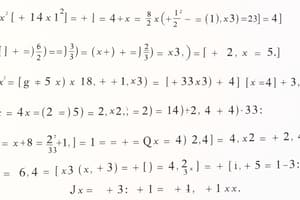Podcast
Questions and Answers
What is a coefficient?
What is a coefficient?
- A number multiplied by a variable in an algebraic expression (correct)
- A term without a variable
- The result of a multiplication operation
- A number that is added to the variable
What are like terms?
What are like terms?
Terms that contain the same variables raised to the same power.
What does the distributive property state?
What does the distributive property state?
a(b + c) = ab + ac; a number outside the parenthesis can be multiplied to each term within the parenthesis.
What is a factor?
What is a factor?
What is factoring?
What is factoring?
What are numeric expressions?
What are numeric expressions?
What are algebraic expressions?
What are algebraic expressions?
What is the maximum value?
What is the maximum value?
What is the minimum value?
What is the minimum value?
What are equations?
What are equations?
What is an exponent?
What is an exponent?
What is a square root?
What is a square root?
What is the order of operations?
What is the order of operations?
What is a base number?
What is a base number?
Flashcards are hidden until you start studying
Study Notes
Algebraic Terms and Concepts
- Coefficient: A numerical factor in front of a variable, crucial for determining the value of the term in algebraic expressions.
- Like Terms: Terms sharing the same variable and exponent, allowing for simplification and combination during addition or subtraction.
Properties and Operations
- Distributive Property: Fundamental property simplifying expressions by multiplying a term across terms within parentheses, expressed as a(b + c) = ab + ac.
- Factor: A basic element in multiplication, representing numbers that combine to form a product; essential in simplifying expressions.
- Factoring: The process of rewriting an expression as a product of its factors, enhancing the capability to solve equations and simplify expressions.
Types of Expressions
- Numeric Expressions: Composed exclusively of numbers and operations (e.g., addition, subtraction), exemplifying basic arithmetic without variables.
- Algebraic Expressions: Involves variables, numbers, and operations, forming the backbone of algebraic equations and problem-solving.
Value Concepts
- Maximum Value: Represents the highest possible amount or degree within a given context, often used in optimization problems.
- Minimum Value: Indicates the lowest possible amount, crucial for analyzing ranges and constraints in mathematical scenarios.
Equations and Relations
- Equations: Statements asserting the equivalence of two expressions, pivotal in algebra for solving for unknown values (e.g., 3 x 9 = 27; 8 + x = 10).
Exponential Notation
- Exponent: Represents how many times a base number is multiplied by itself, key for understanding powers and roots in mathematics.
- Square Root: The value that, when multiplied by itself, yields the original number; important for solving quadratic equations and understanding geometric relationships.
Order of Operations
- Order of Operations (PEMDAS): A specific sequence for evaluating expressions, crucial for maintaining consistency in calculations: Parentheses, Exponents, Multiplication and Division (left to right), Addition and Subtraction (left to right).
Base Numbers
- Base Number: The foundational number in exponential expressions that is raised to a power, serving as the basis for calculating powers and understanding exponential growth.
Studying That Suits You
Use AI to generate personalized quizzes and flashcards to suit your learning preferences.




